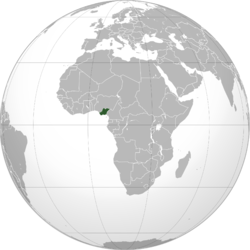Republic of Biafra
| Republic of Biafra | ||||||||||
| Bịafra | ||||||||||
| Unrecognized state | ||||||||||
|
||||||||||
|
||||||||||
|
Motto "Peace, Unity, and Freedom." |
||||||||||
|
Anthem Land of the Rising Sun |
||||||||||
|
Green: Republic of Biafra.
|
||||||||||
|
Republic of Biafra in May 1967
|
||||||||||
| Capital | Enugu | |||||||||
| Languages | Igbo (Predominant) Efik · Annang · Ibibio · Ijaw |
|||||||||
| Religion | Christianity | |||||||||
| Government | Republic | |||||||||
| President | C. Odumegwu Ojukwu | |||||||||
| Historical era | Cold War | |||||||||
| • | Established | 30 May 1967 | ||||||||
| • | Rejoins Federal Nigeria | 15 January 1970 | ||||||||
| Area | ||||||||||
| • | 1967 | 77,306 km² (29,848 sq mi) | ||||||||
| Population | ||||||||||
| • | 1967 est. | 13,500,000 | ||||||||
| Density | 174.6 /km² (452.3 /sq mi) | |||||||||
| Currency | Biafran pound | |||||||||
|
||||||||||
| Minahan, James (2002). Encyclopedia of the Stateless Nations: S-Z. Greenwood Publishing Group. p. 762. ISBN . | ||||||||||
Biafra, officially the Republic of Biafra, was a secessionist state in eastern Nigeria that existed from 30 May 1967 to January 1970. It took its name from the Bight of Biafra, the Atlantic bay to its south. The inhabitants were mostly the Igbo people who led the secession due to economic, ethnic, cultural and religious tensions among the various peoples of Nigeria. Other ethnic groups that constituted the republic were the Efik, Ibibio, Annang, Ejagham, Eket, Ibeno and the Ijaw among others.
The secession of the Biafran region was the primary cause of the Nigerian Civil War, also known as the Biafran War. The state was formally recognised by Gabon, Haiti, Ivory Coast, Tanzania and Zambia. Other nations which did not give official recognition, but provided support and assistance to Biafra included Israel, France, Spain, Portugal, Norway, Rhodesia, South Africa and the Vatican City. Biafra also received aid from non-state actors, including Joint Church Aid, Holy Ghost Fathers of Ireland, Caritas International, MarkPress and U.S. Catholic Relief Services.
...
Wikipedia




